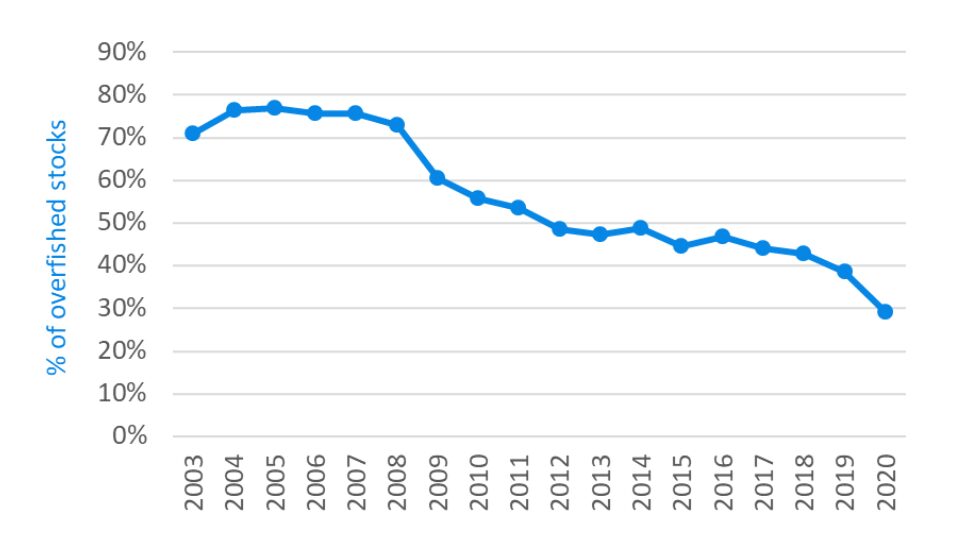Oceana highlights more work needed to end overfishing in European waters and to take into account ecosystem considerations
Press Release Date: May 31, 2022
Location: Brussels
Contact:
Emily Fairless, Communications Officer | email: efairless@oceana.org | tel.: +32 478 038 490
Good progress in Atlantic, but slower in Mediterranean
Oceana recommends measures for most depleted stocks and forage fish
Brussels – Reacting to today’s European Commission (EC) communication on the sustainability of EU fisheries and implementation of the Common Fisheries Policy (CFP), Oceana welcomes the progress the EC and Member States have made to decrease the overfishing rate in the North-East Atlantic in recent years, but underlines that further action is needed to fully implement the CFP, particularly in the Mediterranean where the situation is still dire.
“The progress in the North-East Atlantic shows that the Common Fisheries Policy is working. But action by Member States is still generally lagging – and we have no time to lose. We need to rebuild abundant fish populations, in all EU seas, and to fully implement the policy and transition to low-impact fisheries,” said Vera Coelho, Oceana´s Senior Director, Advocacy in Europe. “The ongoing biodiversity loss and climate crisis leave no room for the management mistakes of the past or for a laissez-faire approach. “
Despite the failure to meet the CFP’s legally binding obligation to phase out overfishing by 2020, according to the EC communication, the rate of overfishing has decreased from around 75% in the mid-2000s to 29% more recently in North-East Atlantic waters, continuing an overall recovery trend1. However, no progress has been registered in the Mediterranean and Black Seas with an 85% rate of overfishing and with some populations of species like hake, sardine or red shrimp at high risk of collapse.

Overfishing trend in the NE Atlantic. Data source: STECF Adhoc 22-01
The ocean conservation NGO urges the EC and Member States to urgently recover the most overexploited populations in European waters, some of which have been below safe biological limits for several decades, to make them more resilient to the impacts of the climate crisis. Oceana further recommends to the parties concerned to take into account ecosystem considerations when setting fishing opportunities for forage fish, as they significantly contribute to the diets of marine life such as marine mammals, seabirds and other commercial fish species.
Background:
Ahead of the European Commission’s report on the functioning of the CFP, expected by December 2022, Oceana and other NGOs are calling on EU institutions and Member States to better follow and enforce the rules of the policy, rather than start from scratch and trigger a new reform at this stage.
Oceana urges the EU institutions – the European Commission, European Parliament, Council of the EU – and the Member States to fully implement the CFP and speed up the transition to low-impact, sustainable fisheries and to an ecosystem-based approach to management.
The CFP must be fully applied if the EU is to deliver on the objectives of the European Green Deal and to build back better after the Covid-19 crisis. Overfishing and destructive fishing practices have been the main cause of marine biodiversity loss for the last 40 years and they also critically undermine the resilience of fish, seabirds, marine mammals and other wildlife to the impacts of climate change.
* Ends *
Note to editors:
1. Last year, an increase in the overfishing rate in the North-East Atlantic was detected, from 38% to 43%, but this seems to have been a one-off anomaly in the scientific assessment as this year’s assessment corrects that increase and the overall overfishing trend continues to be downward.
Learn more:
Joint NGO position paper on the CFP – “Common Fisheries Policy: Mission not yet accomplished”
#CFPreality #EndOverfishing


